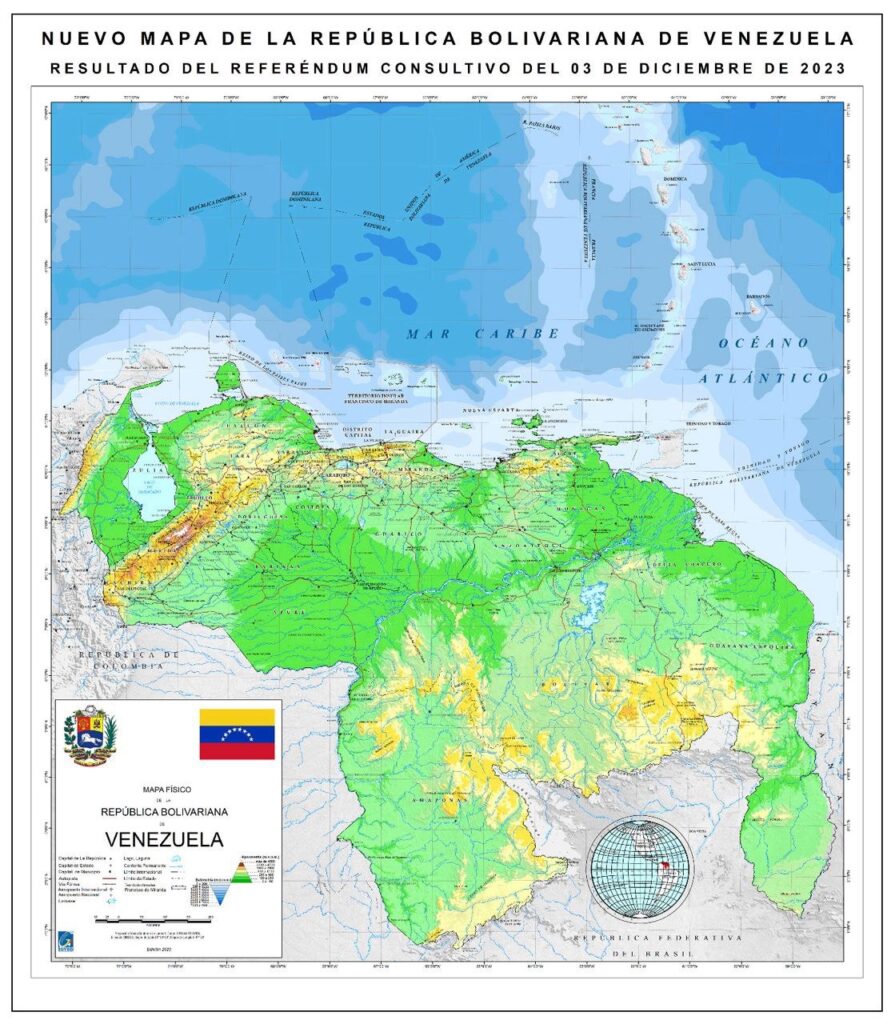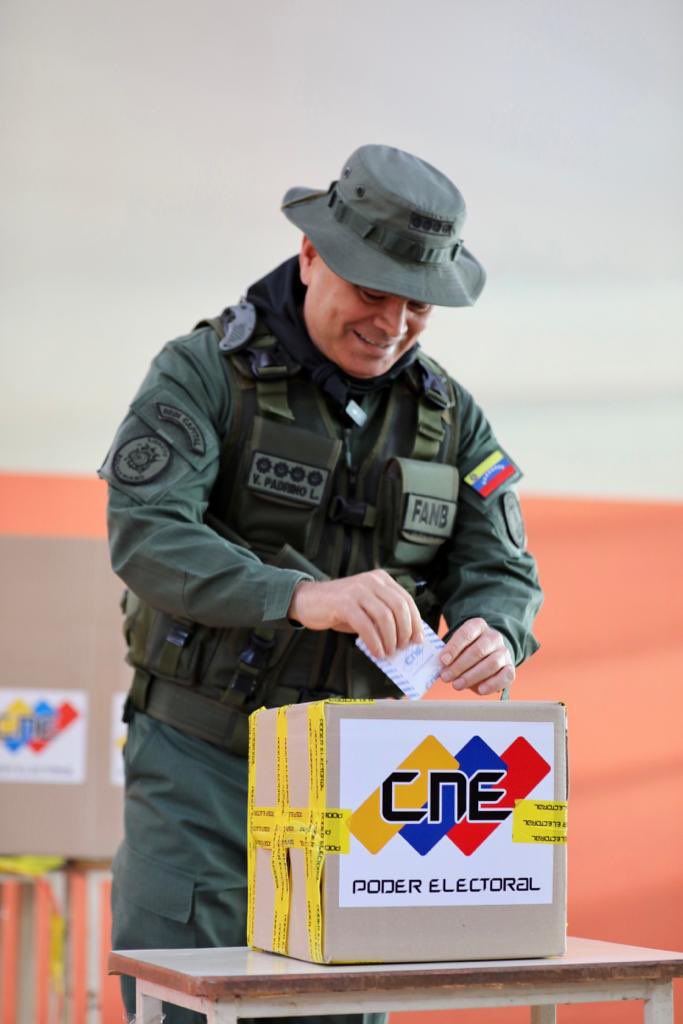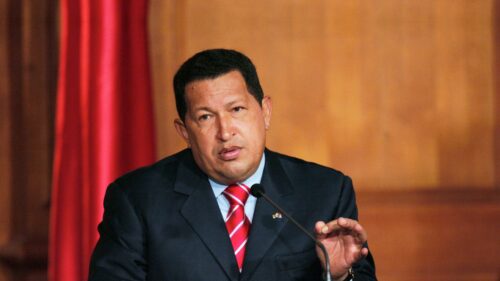On December 3, the people of Venezuela took to the polls. This was not for any ordinary election. Rather, the Venezuelan government held a referendum on the subject of annexing Essequibo territory, which lies in neighboring Guyana and is oil-rich. Venezuela and Guyana have been involved in a decades-long dispute over this territory.
For those who need a brush-up on their history, Guyana is a former British colony. It gained independence in 1966, but Venezuela has claimed two-thirds of Guyana’s land since 1899. However, the an 1899 arbitral tribunal in Paris ruled in favor of British Guyana, granting the British Empire the Essequibo territory. The tribunal drew the territorial line between the states of Venezuela and Guyana. For 124 years, Venezuela has denounced this line.

Hope came for Venezuela in the form of the 1966 Geneva Agreement on the eve of Guyana’s independence. Venezuela and the British Empire signed this agreement with the understanding that Venezuela and Guyana would agree to settle the border dispute at a later date. It seems that now Venezuela is coming to collect on this agreement but is doing so unilaterally.

Venezuela questions the people’s support
Composed of five questions, the referendum aimed to understand the position Venezuelan citizens took on the current situation of Guyana. The first question asked if the citizens rejected the decision of the 1899 Tribunal. Venezuela sees this tribunal as taking away its national sovereignty. If the country’s citizens reject the tribunal decision, then Venezuela can assert its ownership over Guyanese land with popular support.
The second question asked if citizens embraced the 1966 Geneva Agreement. Despite being signed in 1966, no move has been made towards fulfilling the agreement. The territorial lines remain as they were in 1899. Venezuela must assert the authority granted through the agreement if it wishes to take back its territory.
The referendum’s third question undermines the second: Do Venezuelan citizens reject the jurisdiction of the International Court of Justice? This question sets up the idea that the Venezuela-Guyana dispute must be settled domestically rather than internationally. Both the 1899 Tribunal and the 1966 Geneva agreement were settled with major colonial players. This time around, Venezuela is hoping to settle this within Latin America.
However, in order to settle this within Latin America, Venezuela must know where its citizens stand on the issue of military force. This is what the fourth question asks: If Guyana comes to defend the territorial line with its own military, will citizens support forceful action? Or will Venezuela’s own citizens deny the use of the military?

CAPTION: On December 3, 2023, Venezuelan Defense Minister Vladimir Padrino cast his vote in full combat fatigues.
The fifth question poses Venezuela’s solution to newly acquired territory. It asks if citizens would embrace the declaration of a new state within Venezuela’s territory. This new state would issue distinct “Guyana-Essequibo” IDs to identify former Guyanese citizens. In other words, Venezuela is seeking support to add a new state within its borders.
Venezuela reported that over 95% of the millions of voters answered “yes” to every question, claiming near-unanimous support for the annexation of oil-rich Guyanese land. However, these numbers may have been falsified. Many observers have said that the turnout was much lower than the reported numbers.
Venezuela relies heavily on its military
The unreliability of voter turnout is in keeping with the election fraud committed by current Venezuelan president Nicolás Maduro in 2018. It is well known that Maduro’s reign has undermined democracy in Venezuela. So, it is no surprise that the referendum numbers do not reflect reality.
The issues the referendum raises have no real impact on normal citizens. It is an anti-Western, political move. However, the potential invasion and subsequent annexation of Guyana still lies in the indeterminate future. Despite the lack of investment, the country’s bankruptcy, Western trade sanctions, and its inability to drill for oil, Venezuela still eyes more oil-rich territory. This aggressive posturing is a risk because the Venezuelan military is still strong. Its strength comes from the Chavista movement of the 1990s. The militaristic ideologies of revolutionary leader Hugo Chávez may have been introduced in 1992, but his influence remains ingrained in Venezuelan politics.
The influence of the Chavista movement is only one facet of this dispute. Other factors are in play, namely the lack of media attention to the tensions between Venezuela and Guyana. With the conflicts in Ukraine and Israel-Gaza taking center stage, Venezuela is banking on the hypothesis that the world is tired of conflict. A world tired of conflict won’t have the energy to turn its news cameras onto Guyana.
It takes no imagination to predict what will happen if Venezuela and Guyana fail to reach an agreement. The presence of uniformed military personnel at Venezuela’s voting centers makes the country’s stand on the use of force clear. As the eyes of the world are turned away from Guyana, Venezuela is free to move into the mineral-rich Essequibo territory. Only one question remains unanswered: What will Guyana do? And what will other countries do to protect Guyana?
[Cheyenne Torres edited this piece.]
The views expressed in this article/podcast are the author’s own and do not necessarily reflect Fair Observer’s editorial policy.

















Comment